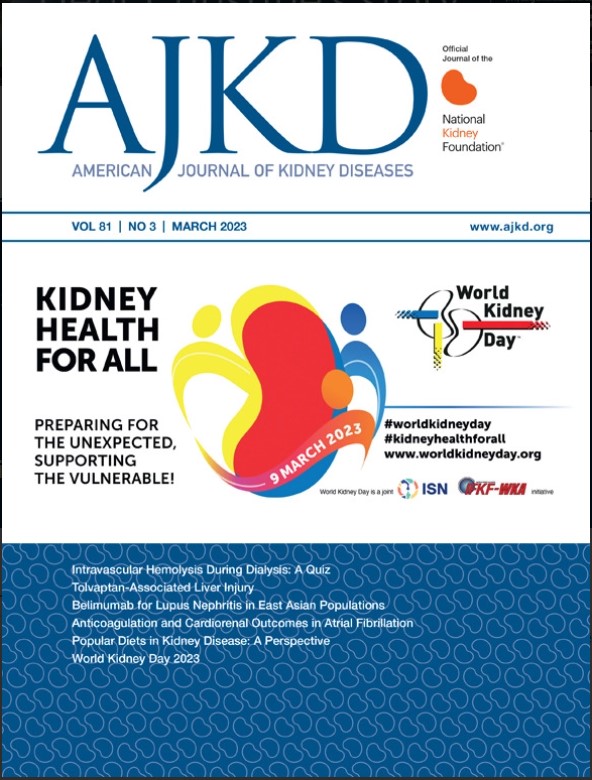Explaining International Trends in Mortality on Hemodialysis Through Changes in Hemodialysis Practices in the Dialysis Outcomes and Practice Patterns Study (DOPPS)
IF 8.2
1区 医学
Q1 UROLOGY & NEPHROLOGY
引用次数: 0
Abstract
Rationale & Objective
Case-mix adjusted hemodialysis mortality has decreased since 1998. Many factors that influence mortality may have contributed to this trend, and these associations may differ by continental region. We studied changes in hemodialysis facility practices over time and their potential role in mediating changes in patient survival.
Study Design
Observational prospective cohort study.
Setting & Participants
Adult hemodialysis patients treated in 500 hemodialysis facilities participating in the Dialysis Outcomes and Practice Patterns Study (DOPPS) between 1999 and 2015 in the United States, Japan, and 4 European countries: Germany, Italy, Spain, and the United Kingdom.
Predictors
Four practice measures at each facility: the percentages of patients with Kt/V ≥ 1.2, interdialytic weight gain [IDWG] < 5.7%, phosphorus < 6 mg/dL, and using arteriovenous fistulas (AVFs).
Outcome
Patient survival.
Analytical Approach
Mediation analyses, adjusted for case mix, were conducted using 3-year study phase as the exposure and facility practice measures as potential mediators.
Results
In Europe, we observed a 13% improvement in overall case-mix adjusted survival per decade. Trends in facility practice measures, especially Kt/V and phosphorus, explained 10% improvement in case-mix survival per decade, representing 77% (10% explained of 13% improvement) of the observed improvement. In Japan, 73% of the observed 12%/decade improvement in case-mix adjusted survival could be attributed to facility practices, especially Kt/V and IDWG. In the United States, 56% of the observed 47%/decade improvement in case-mix adjusted survival could be attributed to facility practices, especially AVF use and phosphorus control.
Limitations
Unmeasured changes in the characteristics of the patient population over this period may confound the observed associations.
Conclusions
The improvements in adjusted hemodialysis patient survival in Europe, Japan, and the United States from 1999 to 2015 can be largely explained by improvements in specific facility practices. Future changes in patient survival may be responsive to further evolution in the implementation of common clinical practices.
Plain-Language Summary
Case-mix adjusted survival of patients treated with hemodialysis has improved over the last 2 decades in the United States, Japan, and Europe. Some of this improvement can be explained by region-specific changes in 4 dialysis practices, namely increases in the proportions of patients achieving (1) Kt/V ≥ 1.2, (2) serum phosphorus levels < 6 mg/dL, (3) interdialytic weight gain < 5.7% of body weight, and/or (4) use of arteriovenous fistulas as vascular access, with the magnitude varying according to region-specific trends in these practices. These findings suggest that further improvement in these practice measures may be attended by further reductions in mortality among patients treated with maintenance hemodialysis.
通过透析结果和实践模式研究 (DOPPS) 中血液透析实践的变化来解释血液透析死亡率的国际趋势。
理由和目标:自 1998 年以来,病例组合调整后的血液透析死亡率有所下降。许多影响死亡率的因素可能促成了这一趋势,而且这些关联可能因大陆地区而异。我们研究了血液透析设施操作随时间推移而发生的变化,以及这些变化对患者生存率变化的潜在影响:观察性前瞻性队列研究:研究设计:观察性前瞻性队列研究。研究地点和参与者:1999年至2015年期间在美国、日本和4个欧洲国家参与透析结果实践模式研究(DOPPS)的500家血液透析机构接受治疗的成人血液透析患者:预测因素:每个机构的四项实践指标:Kt/V>1.2 的患者百分比、透析间期体重增加 [IDWG]:分析方法分析方法:以3年研究阶段为暴露因子,以医疗机构的实践措施为潜在因子,对病例组合进行调整后进行中介分析:在欧洲,我们观察到病例组合调整后的总体生存率每十年提高了 13%。设施实践措施的趋势,尤其是 Kt/V 和磷,解释了每十年病例组合存活率提高 10%的原因,占观察到的提高的 77%(13% 提高中的 10%)。在日本,观察到的病例组合调整后存活率每十年 12% 的改善中有 73% 可归因于设施实践,尤其是 Kt/V 和 IDWG。在美国,观察到的病例组合调整后存活率每十年 47% 的改善中,56% 可归因于设备操作,尤其是 AV 造瘘器的使用和磷控制:局限性:在此期间,未测量的患者群体特征变化可能会混淆观察到的关联:结论:从 1999 年到 2015 年,欧洲、日本和美国调整后的血液透析患者存活率有所提高,这在很大程度上归因于特定设备操作的改进。未来患者生存率的变化可能会随着常见临床实践的进一步发展而变化。
本文章由计算机程序翻译,如有差异,请以英文原文为准。
求助全文
约1分钟内获得全文
求助全文
来源期刊

American Journal of Kidney Diseases
医学-泌尿学与肾脏学
CiteScore
20.40
自引率
2.30%
发文量
732
审稿时长
3-8 weeks
期刊介绍:
The American Journal of Kidney Diseases (AJKD), the National Kidney Foundation's official journal, is globally recognized for its leadership in clinical nephrology content. Monthly, AJKD publishes original investigations on kidney diseases, hypertension, dialysis therapies, and kidney transplantation. Rigorous peer-review, statistical scrutiny, and a structured format characterize the publication process. Each issue includes case reports unveiling new diseases and potential therapeutic strategies.
 求助内容:
求助内容: 应助结果提醒方式:
应助结果提醒方式:


